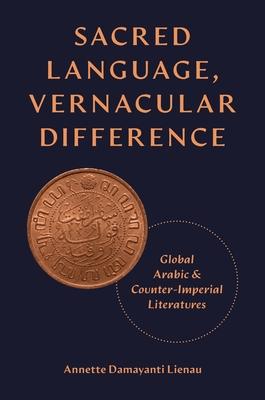How Arabic influenced the evolution of vernacular literatures and anticolonial thought in Egypt, Indonesia, and Senegal
Sacred Language, Vernacular Difference offers a new understanding of Arabic's global position as the basis for comparing cultural and literary histories in countries separated by vast distances. By tracing controversies over the use of Arabic in three countries with distinct colonial legacies, Egypt, Indonesia, and Senegal, the book presents a new approach to the study of postcolonial literatures, anticolonial nationalisms, and the global circulation of pluralist ideas. Annette Damayanti Lienau presents the largely untold story of how Arabic, often understood in Africa and Asia as a language of Islamic ritual and precolonial commerce, assumed a transregional role as an anticolonial literary medium in the nineteenth and twentieth centuries. By examining how major writers and intellectuals across several generations grappled with the cultural asymmetries imposed by imperial Europe, Lienau shows that Arabic--as a cosmopolitan, interethnic, and interreligious language--complicated debates over questions of indigeneity, religious pluralism, counter-imperial nationalisms, and emerging nation-states. Unearthing parallels from West Africa to Southeast Asia, Sacred Language, Vernacular Difference argues that debates comparing the status of Arabic to other languages challenged not only Eurocentric but Arabocentric forms of ethnolinguistic and racial prejudice in both local and global terms.
Book
Sacred Language, Vernacular Difference: Global Arabic and Counter-Imperial Literatures
(Write a Review)
Paperback
$39.95
How Arabic influenced the evolution of vernacular literatures and anticolonial thought in Egypt, Indonesia, and Senegal
Sacred Language, Vernacular Difference offers a new understanding of Arabic's global position as the basis for comparing cultural and literary histories in countries separated by vast distances. By tracing controversies over the use of Arabic in three countries with distinct colonial legacies, Egypt, Indonesia, and Senegal, the book presents a new approach to the study of postcolonial literatures, anticolonial nationalisms, and the global circulation of pluralist ideas. Annette Damayanti Lienau presents the largely untold story of how Arabic, often understood in Africa and Asia as a language of Islamic ritual and precolonial commerce, assumed a transregional role as an anticolonial literary medium in the nineteenth and twentieth centuries. By examining how major writers and intellectuals across several generations grappled with the cultural asymmetries imposed by imperial Europe, Lienau shows that Arabic--as a cosmopolitan, interethnic, and interreligious language--complicated debates over questions of indigeneity, religious pluralism, counter-imperial nationalisms, and emerging nation-states. Unearthing parallels from West Africa to Southeast Asia, Sacred Language, Vernacular Difference argues that debates comparing the status of Arabic to other languages challenged not only Eurocentric but Arabocentric forms of ethnolinguistic and racial prejudice in both local and global terms.Paperback
$39.95